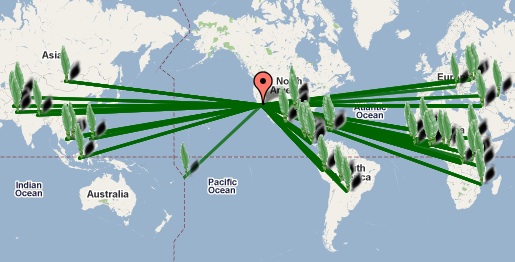The Micro-Finance sector continues to grow, now with over 10,000 Micro-Finance Institutions (MFIs) worldwide. One of these institutions is Kiva. What interested me most about this organisation is that it is set up similarly to Kickstarter, a site I have been following for a number of years. Kiva allows anyone to make small loans to those in developing countries. It provides potential investors with a back story of each person, detailing why they are seeking a loan. Many of the people who request loans have their own businesses that they wish to expand.

The above image provides a scale of how far Kiva loans stretch. Source: http://www.huffingtonpost.com/bob-harris/a-near-zero-cost-approach_b_216018.html
The Micro-Finance movement should definitely be seen as an opportunity for businesses regardless of their location, industry or size. The fact that institutions like Kiva are giving opportunities to anyone to be a part of Micro-Finance should be considered by small businesses who perhaps want to show CSR.
For example, smaller businesses can use this as a chance to donate or lend a realistic amount, while still bringing about benefits to the global community. Larger organisations can be provided with the prospect of being able to partner with an MFI through Micro-Finance. As organisations grow in size, they often outsource parts of production overseas to benefit from lower costs. However, although operating in foreign economies, the charitable work of such organisations often stays at home. The involvement of companies in Micro-Finance initiatives can enable for better consumer perceptions and attitudes in the long run.
Micro-Finance can affect everyone. It gives many the opportunity to have access to traditional banking, something I know I certainly take for granted. MFIs also offer the opportunity for smaller businesses regardless of where they are in the world to grow. This is something we should all take interest in. A sustainable reduction in poverty alongside an increase in the number of enterprises can enable for the global market to grow, become more efficient and competitive. All of which is key to future economic growth and trade.
References
- http://goodplustech.com/tag/examples-of-microfinance/
- http://www.globalissues.org/article/26/poverty-facts-and-stats
- http://www.investopedia.com/terms/m/microfinance.asp#axzz20W3Lvifh
- http://www.investopedia.com/articles/07/microfinance.asp?rp=i
- http://www.hks.harvard.edu/news-events/news/articles/pande-microfinance-programs
- http://www.sef.co.za/
- http://www.visionmicrofinance.com/en/vision-microfinance/success-stories/
- http://www.fgda.org/dati/ContentManager/files/Documenti_microfinanza/rA_Microfinance_Market_Outlook_2014_EN.pdf
- http://www.kiva.org/
- http://www.huffingtonpost.com/bob-harris/a-near-zero-cost-approach_b_216018.html